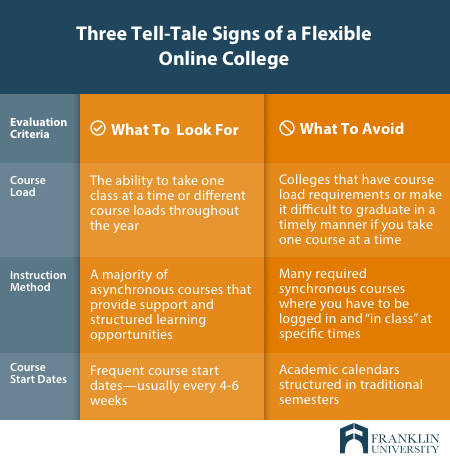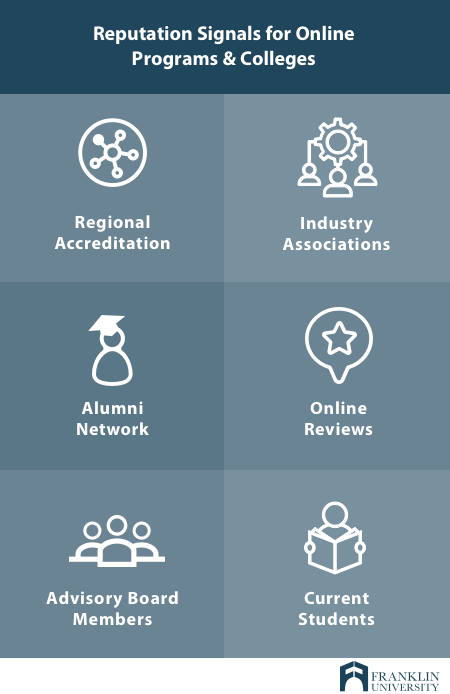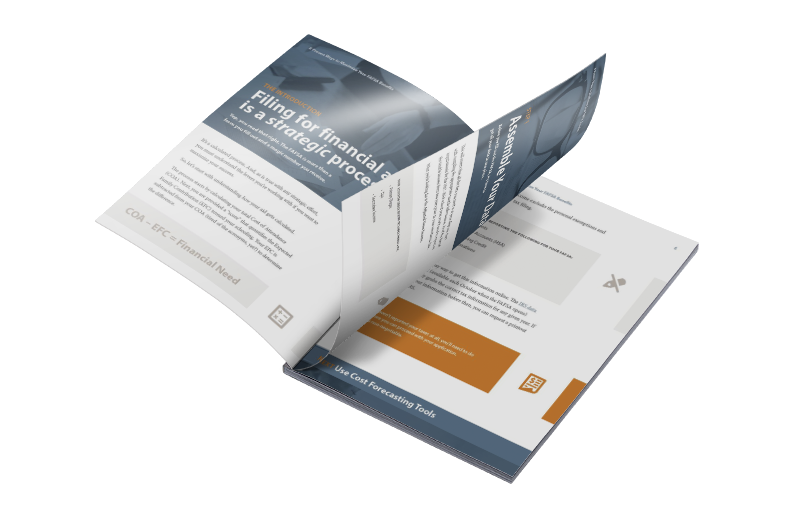Request Information
We're Sorry
There was an unexpected error with the form (your web browser was unable to retrieve some required data from our servers). This kind of error may occur if you have temporarily lost your internet connection. If you're able to verify that your internet connection is stable and the error persists, the Franklin University Help Desk is available to assist you at helpdesk@franklin.edu, 614.947.6682 (local), or 1.866.435.7006 (toll free).
Just a moment while we process your submission.

Best Online Colleges for Adults: How To Rank Your Favorites
Going back to school is a commitment—and it’s one you don’t take lightly. As a working professional, you’re looking for a program that will justify the financial, time and personal investments you’ll make to pursue a degree.
You don’t want to take a break in your career—you want to advance it—so you know you want to complete your degree online. But with 2,255 institutions offering online degrees, how do you know which online college is right for you?
You’ll quickly find every school claims to be the best and rankings only tell part of the story. Even if you narrow it down to a small list of schools, it can get even more difficult to compare programs and identify if it’s truly designed for working adults. Don’t let surface-level qualifications like rankings or accolades sway you. The best online college is the one that’s right for you and your career goals.
Here’s how to cut through the noise and find the best online college for you.
Look for Programs Grounded in Real-World Application
You shouldn’t have to wait until you graduate to reap the benefits of your degree. The best online colleges for working adults prioritize curriculum that’s industry-relevant and immediately applicable. But how do you know if curriculum is relevant when you’re evaluating online colleges?
These are the questions you need to ask:
- Based on course descriptions, will the course content be relevant to the work you do or want to do?
- Are the faculty real-world practitioners who are active in their field?
- Who is responsible for creating course work? Do businesses or industry leaders weigh in on what skills are needed today and in the future?
- How often are courses re-evaluated for industry relevance? Are they consistently updated as technology and job requirements change?
Digging into these types of questions will help you do in-depth research into how well an online education prepares you for the next step in your career.
Find An Online Program That Offers Flexible Scheduling
Heading back to school? Make sure you max out your Financial Aid with the help of this free FAFSA report.
Flexibility is often the number one consideration when evaluating online colleges, especially for working professionals and working parents who balance busy work and personal lives. These are three key signs of whether or not an online program truly offers flexibility to help you earn a degree.
Adaptable Course Loads
Traditional students take four or five classes at a time, which is unrealistic for most working adults. Many adults want the option to take one course at a time, or take different course loads throughout the year. For example, if you’re an accountant, you may want to take a light course load during tax season. Find an institution that allows you to take courses at your own pace—without negatively impacting your ability to graduate.
At Franklin University, major online course sections start every six weeks. So if you need time to focus on a single course, or feel confident you can take on multiple at one time, our staggered schedule makes it easy to choose how you want to learn.
Tailored Instruction Methods
There are two types of online courses—synchronous and asynchronous.
Synchronous courses require you to attend a class at a specific time for a live lecture where all other students are simultaneously logged in and participating in discussion. Asynchronous courses are usually pre-recorded lectures or assignments that can be completed on your own time (within a certain timeframe).
Asynchronous courses are the most flexible, but they should also be high-quality. When evaluating asynchronous courses, investigate the teaching methods used in the course. Ask questions like:
- How are lectures delivered?
- Are there structured learning sessions or tutoring opportunities?
- What types of assignments will I complete?
- Will I need to complete group work assignments?
- What resources do I have at my disposal to help me complete assignments?
The best online colleges will provide ample support and resources, even in courses where you don’t have to be “in class” at the same time as everyone else. Franklin University prides itself on balancing student needs with the best instruction methods for learning subject matter.
“At Franklin, we offer a majority of asynchronous courses,” said Dr. Lynne Hull, Vice President, Student Affairs and Enrollment Management, “If a synchronous course is required, we make sure to build in flexibility for students who may miss a class because of another obligation. No matter what type of class you take, we offer a full suite of support services to make sure you get the same, high-quality education if you live next door or 5,000 miles away.”
The number of synchronous vs. asynchronous courses varies by degree program. When looking at online colleges, you should figure out what balance will work best for your schedule.
Frequent Start Dates
The best online colleges for working professionals have flexible start dates and courses offered frequently. Colleges that follow traditional semester academic calendars are less flexible and will make it more difficult for you to complete a degree at your own pace. Look for colleges that have courses starting every 4-6 weeks.

Seek Online Schools With Affordable Tuition and Friendly Cost-Saving Options
After flexibility, the cost of your education is top-of-mind for working professionals. While most online colleges will publish their tuition cost per credit hour, these numbers may not tell the full story and hidden fees or unexpected costs can dramatically alter the advertised price.
When evaluating how much your online degree will cost, keep these things in mind:
- What is the real cost of tuition? Look at cost per credit hour, the average number of credits in a course, and if the college uses a tiered pricing structure. Sometimes online colleges offer a tiered tuition option where the per-credit rate decreases the more credits you take. While this can be a benefit if you take a larger course load, it could cost you more to take a single course at a time.
- What fees and outside costs will I incur? Look for hidden fees or costs that will increase the total cost of your degree. Some schools require entrance exams, technology fees or require you to come to campus for exams. All of these are sneaky ways your degree can become more expensive.
- What’s the institution’s transfer credit policy? If you’ve already completed college coursework, look for colleges that will accept the credits you earned and apply them toward your degree. Understand the maximum number of credits you can transfer and evaluate how that will impact overall cost.
- Will I have access to financial aid? When looking into financial aid options, make sure you understand if you must meet certain credit hour requirements to receive financial aid. Some types of aid require full-time student status, while others may only require part-time.
- How long will it take to graduate? Look into a program’s time to graduation based on how many courses you complete each year. Most online colleges post the minimum time to graduation, which may or may not be possible for you depending on your schedule.
The best online colleges for working adults often aren’t the ones that cost the least. Instead, they’re the ones that offer the greatest value and return on your investment.
Find a Program With A Strong Reputation and Industry Connections

An online college should offer real-world opportunities. Whether you’re in the same city as the school or across the globe, an online college should be able to help you advance your career.
- Make sure the college is accredited, especially regionally.
- Look for online colleges with industry partnerships, strong ties to professional associations and dedicated career services.
- See if you can connect with alumni or businesses who can testify to the strength of the education.
- Understand who sits on the institution’s advisory board and influences the strategic direction of the university
Choose Online Programs That Specialize In Serving Working Adults or Non-Traditional Students
Not all online colleges are created equal when it comes to serving working adults. Online colleges that are built for working professionals should understand your unique needs, challenges and goals. Make sure you look into more than what a college says—but what they do. An online college that specializes in adult education should be:
Understanding: They should recognize your unique circumstances and how they can best serve you as an individual.
Responsive: They should be readily available to answer your questions and provide easy access to people, information and resources.
Dedicated: They should have a wealth of success stories and a demographic of students that speaks to their focus on working professionals.
Choose Confidently—Find The Right Program For You
Now you know how to evaluate the best online colleges for working adults. But remember: you’re not just looking for the best online college, you’re looking for the best online college for you. Your education goals, schedule and career aspirations should always come first when deciding on an online degree.
See why Franklin University is purpose built to meet the needs of working adults and see if we offer the right online degree program for you.





